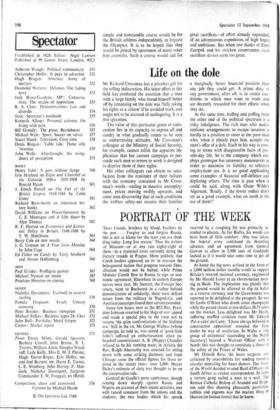PORTRAIT OF THE WEEK
'Dear friends, brothers by blood, brothers by the pen . . . Forgive us and forgive Russia. She is not to blame for the tears you are shed- ding today. Long live reason.' Thus the writers of Moscow—or at any rate eighty-eight of them—in a fraternal letter currently doing the literary rounds in Prague. More publicly, five Czech leaders appeared on Tv to reassure the beleaguered nation that progress towards liber- alisation would not be halted, while Prime Minister Cernik flew to Russia to sign an eco- nomic agreement. Elsewhere in eastern Europe nerves were taut. Mr Stewart, the Foreign See-. retary, went to Bucharest in a rather belated demonstration of solidarity, there were defiant noises from the military in Yugoslavia, and Austrian conscripts found their service extended.
Some few hours west as the B52 flies, Presi- dent Johnson reverted to his 'dogs of war' appeal and made a special plea to the USSR not to resume 'the grim confrontations of the Stalinist era.' Still in the us, Mr George Wallace (whose campaign, he told us, was aimed at 'good little folks') suffered an embarrassment when ex- baseball commissioner A. B. (Happy) Chandler refused to be his running mate; in Atlanta the Rev. Ralph Abernathy was arrested for sitting down with some striking dustmen, and from Chicago came the official figures for those in- jured in the recent riots: over 1,000. Mayor Daley's estimate of sixty was thought to be on the conservative side.
General de Gaulle's press conference, though coming down sharply against Russia and Nigeria on. account of their recent activities, met with rancid comment from the unions and the students, the two bodies which his speech (marred by a coughing fit) was primarily in- tended to placate. As for Biafra, his words can have been of little comfort: Aba was taken, the federal army continued its throttling advance, and an agreement from General Gowon to allow in 3,500 tons of foodstuffs looked as if it would take some time to get off the ground.
At home the big news arrived in the form of a 2,000 million dollar standby credit to support Britain's revered national currency, engineered by Mr Harold Lever at an eleven-nation meet- ing in Basle. The implication was plainly that the pound would be allowed to slip its halter as a reserve currency and the Government was reported to be delighted at the prospect. So was Sir Leslie O'Brien who drank some champagne while the pound closed at two dollars 38.71 cents on the market. Less delighted was Mr Heath, suffering muffled criticism from Mr Edward 'Pat-a-cake' du Cann : 'I have always believed in constructive apposition' revealed the Tory leader by way of retaliation. In Wales a 'tiny group of extremists' (according to the Welsh Secretary) injured a Warrant Officer with a bomb; this was thought to constitute a threat to the safety of the Prince of Wales.
Mr Donald Ross, the heart surgeon, was criticised by anaesthetists for sending round a circular appealing for heart donors. The News of the World decided to send Basil d'Oliveira to South Africa as cricket correspondent. In Soho a torture gang nailed a man to a wall. The Roman Catholic Bishop of Arundel and Brigh- ton said that shooting pheasants, partridges, rabbits and pigeons was the nearest thing to Heaven (in human terms) that he knew.


































 Previous page
Previous page